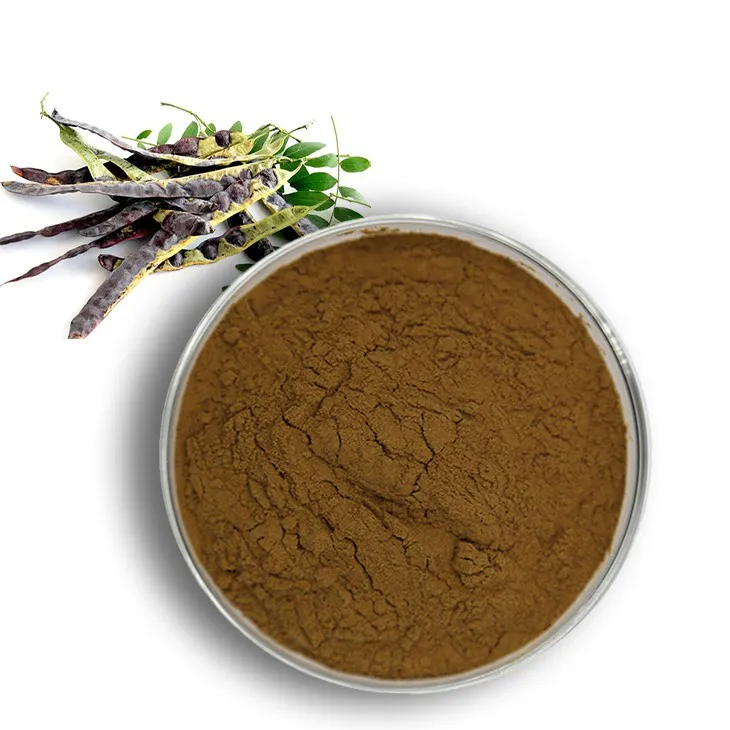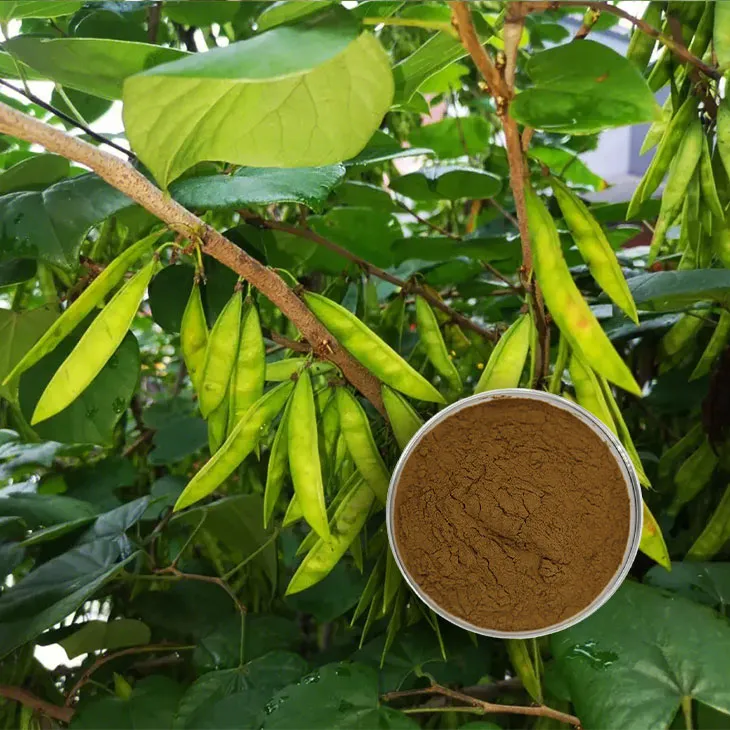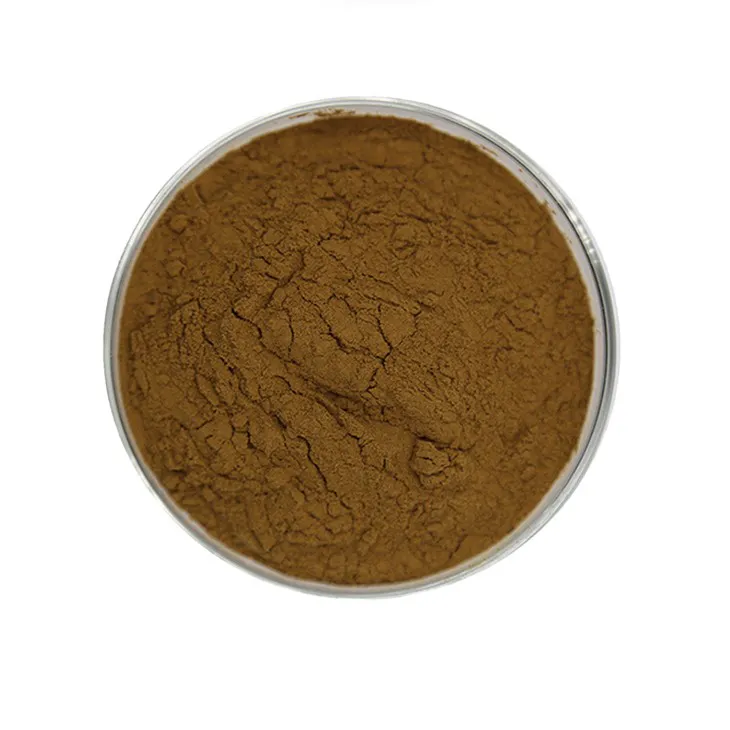- 0086-571-85302990
- sales@greenskybio.com
Certified organic saponin extract.
2024-12-13

1. Introduction to Certified Organic Saponin Extract
The certified organic Saponin Extract is a truly remarkable substance. It has gained official certification from relevant authorities, which serves as a strong guarantee of its authenticity and high quality. Saponins, in general, are a class of naturally occurring glycosides. These can be found in a wide variety of plants across different regions. The fact that it is an organic extract means that the extraction process is carried out in a way that not only preserves their natural properties but also adheres to strict environmental and safety standards.

2. The Nature of Saponins
Saponins are complex molecules with unique chemical structures. They are composed of a sugar part (glycone) and a non - sugar part (aglycone). This structure gives them their characteristic properties. In plants, saponins play various roles, such as acting as a defense mechanism against pests and diseases. For example, some plants produce saponins to make themselves less palatable to herbivores.
There are different types of saponins, and their distribution in plants can vary significantly. Some plants may contain high levels of saponins in their roots, while others may have them predominantly in their leaves or fruits. This variation in distribution also affects the extraction methods used to obtain the saponin extract.

3. The Organic Extraction Process
3.1 Selection of Raw Materials
The first step in the organic extraction of saponin is the careful selection of raw materials. Only plants that are grown organically, without the use of synthetic pesticides, fertilizers, or genetically modified organisms (GMOs), are chosen. This ensures that the final extract is free from any contaminants that may be associated with non - organic farming practices. For instance, plants from certified organic farms are inspected regularly to ensure compliance with organic standards.
3.2 Extraction Methods
There are several methods for extracting saponins from plants in an organic way. One common method is solvent extraction. In this process, a suitable organic solvent, such as ethanol or methanol, is used to dissolve the saponins from the plant material. However, great care must be taken to ensure that the solvent is of high purity and does not introduce any unwanted substances into the extract. Another method is supercritical fluid extraction, which uses supercritical carbon dioxide as the solvent. This method has the advantage of being more environmentally friendly and can often result in a purer extract.
3.3 Purification and Certification
After extraction, the saponin - rich extract needs to be purified. This may involve processes such as filtration, centrifugation, and chromatography to remove any impurities, such as plant fibers, proteins, or other non - saponin components. Once the purification process is complete, the extract is sent for certification. Certification bodies conduct rigorous tests to verify that the extract meets all the requirements of being organic, including tests for pesticide residues, heavy metal content, and compliance with organic production regulations.
4. Applications in the Pharmaceutical Area
4.1 Anti - cancer Properties
One of the most promising areas of research for certified organic Saponin Extract is in the field of oncology. Some saponins have shown very promising results in inhibiting tumor cell growth in preliminary research. For example, certain saponins have been found to interfere with the cell cycle of cancer cells, preventing them from dividing and multiplying uncontrollably. They may also induce apoptosis (programmed cell death) in cancer cells, which is a crucial mechanism for eliminating cancerous cells from the body. However, more in - depth research is still needed to fully understand the mechanisms of action and to develop effective cancer therapies based on saponin extracts.
4.2 Anti - inflammatory Effects
Saponins also possess anti - inflammatory properties. Inflammation is a common factor in many diseases, including autoimmune disorders and chronic inflammatory conditions. Studies have shown that saponin - based compounds can reduce the production of inflammatory cytokines, which are small proteins that play a key role in the inflammatory response. By reducing inflammation, saponin extracts may have the potential to treat or alleviate symptoms in a variety of inflammatory diseases.
4.3 Immunomodulatory Activity
Another important aspect of saponin extract is its immunomodulatory activity. The immune system is a complex network of cells and molecules that defends the body against foreign invaders. Saponins can modulate the immune response by enhancing the activity of certain immune cells, such as macrophages and lymphocytes. This can help the body to better fight off infections and diseases. Additionally, in some cases, saponins may also help to regulate an overactive immune system, which is beneficial in autoimmune diseases where the immune system mistakenly attacks the body's own tissues.
5. Applications in the Food and Beverage Industry
5.1 Natural Additive
In the food and beverage industry, certified organic saponin extract can be used as a natural additive. It can add unique flavors to products. For example, some saponin - containing plants have a slightly bitter or astringent taste, which can be used to enhance the flavor profile of certain foods and beverages. It can also be used as a natural emulsifier, helping to keep oil and water - based components in a stable mixture. This is particularly useful in products such as salad dressings, mayonnaise, and some dairy products.
5.2 Potential Health - promoting Effects
In addition to its flavor - enhancing properties, saponin extract may also offer potential health - promoting effects in food and beverages. Some saponins have been shown to have antioxidant properties. Antioxidants are important for protecting the body against oxidative stress, which is associated with various diseases such as heart disease, cancer, and neurodegenerative disorders. By adding saponin extract to food and beverages, consumers may be able to benefit from these antioxidant effects. Moreover, saponins may also have a positive impact on digestion. They can stimulate the secretion of digestive enzymes, which can improve the digestion and absorption of nutrients from food.6. Challenges and Future Outlook
6.1 Challenges in Production
Despite the many potential applications of certified organic saponin extract, there are still some challenges in its production. One of the main challenges is the relatively low yield of saponin extraction from plants. This means that a large amount of plant material is often required to obtain a sufficient quantity of the extract. Additionally, the extraction and purification processes can be complex and costly, which may limit the large - scale production of high - quality saponin extract. Another challenge is the variability in saponin content among different plant species and even within the same species, depending on factors such as growth conditions and plant maturity. This variability can make it difficult to standardize the production process and ensure consistent product quality.
6.2 Future Research Directions
In the future, more research is needed to overcome these challenges and fully realize the potential of saponin extract. For example, research efforts could be focused on developing more efficient extraction methods to increase the yield of saponin extraction. This could involve exploring new solvents or extraction techniques that are both cost - effective and environmentally friendly. Another area of research could be the genetic engineering of plants to increase their saponin content. However, this would need to be done in a way that still adheres to organic standards. In terms of applications, more in - depth studies are required to further understand the health benefits of saponin extract and to develop new products based on it. For instance, in the pharmaceutical area, more clinical trials are needed to determine the efficacy and safety of saponin - based drugs. In the food and beverage industry, research could be conducted to develop new products that make better use of the unique properties of saponin extract.7. Conclusion
The certified organic saponin extract is a substance with great potential. Its natural origin and the fact that it is organically extracted make it an attractive option for various applications. In the pharmaceutical area, it shows promise in treating diseases such as cancer, inflammation, and in modulating the immune system. In the food and beverage industry, it can be used as a natural additive with both flavor - enhancing and potential health - promoting properties. However, there are still challenges in its production that need to be addressed. With continued research and development, it is expected that the full potential of this remarkable extract will be unlocked in the future.
FAQ:
What is a certified organic saponin extract?
A certified organic saponin extract is a substance that is verified by relevant authorities. Saponins are natural glycosides found in many plants, and the extract is obtained through an organic process which ensures its authenticity, quality, and compliance with environmental and safety standards.
What are the sources of saponins for the organic extract?
Saponins can be found in a variety of plants. Different plants may be used as sources for the organic saponin extract, depending on the specific type of saponin required and the properties desired for the extract.
How is the organic saponin extract used in the pharmaceutical area?
In the pharmaceutical area, the organic saponin extract may be studied for its potential anti - cancer properties. Some saponins have demonstrated promising results in inhibiting tumor cell growth in preliminary research, so the extract could potentially be developed into drugs or used in further cancer - related research.
What are the benefits of using saponin extract as a natural additive in the food and beverage industry?
As a natural additive in the food and beverage industry, saponin extract can provide unique flavors. It may also have potential health - promoting effects, although more research may be needed to fully understand and confirm these effects.
How is the quality of the certified organic saponin extract ensured?
The quality of the certified organic saponin extract is ensured through the certification process by relevant authorities. This includes adhering to strict organic extraction processes that preserve the natural properties of saponins while also meeting environmental and safety standards.
Related literature
- The Bioactivity of Saponins: Current Trends and Future Perspectives"
- "Organic Saponin Extracts: A Review of Their Properties and Applications"
- "Saponins in Medicinal Plants: Extraction, Characterization, and Pharmacological Activities"
- ▶ Hesperidin
- ▶ Citrus Bioflavonoids
- ▶ Plant Extract
- ▶ lycopene
- ▶ Diosmin
- ▶ Grape seed extract
- ▶ Sea buckthorn Juice Powder
- ▶ Fruit Juice Powder
- ▶ Hops Extract
- ▶ Artichoke Extract
- ▶ Mushroom extract
- ▶ Astaxanthin
- ▶ Green Tea Extract
- ▶ Curcumin
- ▶ Horse Chestnut Extract
- ▶ Other Product
- ▶ Boswellia Serrata Extract
- ▶ Resveratrol
- ▶ Marigold Extract
- ▶ Grape Leaf Extract
- ▶ New Product
- ▶ Aminolevulinic acid
- ▶ Cranberry Extract
- ▶ Red Yeast Rice
- ▶ Red Wine Extract
-
Thunder God Vine Extract
2024-12-13
-
Fenugreek Extract Powder
2024-12-13
-
White Peony Extract
2024-12-13
-
Dandelion Leaf Extract
2024-12-13
-
Nutmeg Extract
2024-12-13
-
Eyebright Extract
2024-12-13
-
Lemon Juice Powder
2024-12-13
-
Polygonum multiflorum extract
2024-12-13
-
Black Pepper Extract
2024-12-13
-
Epimedium extract powder
2024-12-13





















